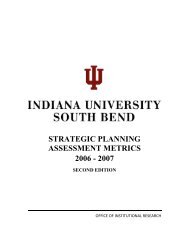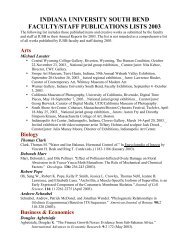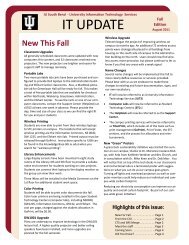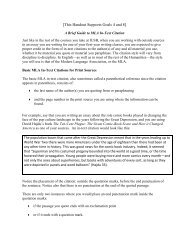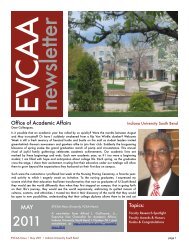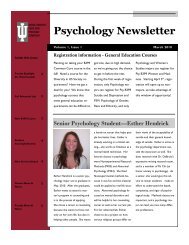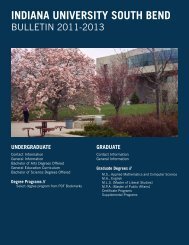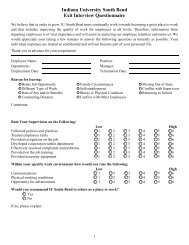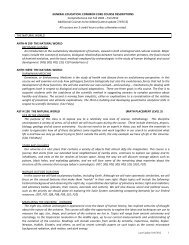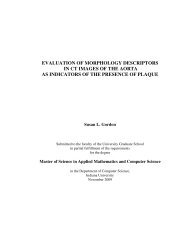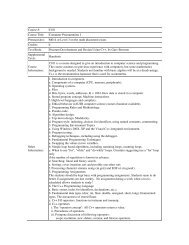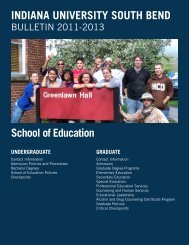School of Business and Economics | Indiana University South Bend
School of Business and Economics | Indiana University South Bend
School of Business and Economics | Indiana University South Bend
You also want an ePaper? Increase the reach of your titles
YUMPU automatically turns print PDFs into web optimized ePapers that Google loves.
FA C U LT Y S C H O L A R S H I P | 2 0 0 5<br />
Research shows how foreign investment helps grow businesses<br />
Often the world presents intriguing trends that <strong>of</strong>fer a<br />
natural setting to study competing ideas on the best way<br />
to manage <strong>and</strong> grow businesses, explains associate pr<strong>of</strong>essor<br />
<strong>of</strong> management, Murali Chari. The 1990s presented<br />
one such opportunity in Japan.<br />
The growing prosperity <strong>of</strong> Japan <strong>and</strong> the global ascendancy<br />
<strong>of</strong> Japanese firms in the 1980s fueled a rush to study<br />
Japanese business practices. One <strong>of</strong> these practices credited<br />
for the successes <strong>of</strong> Japan was the manner in which<br />
Japanese businesses obtained capital. Japanese businesses<br />
were financed through a consortium <strong>of</strong> banks whose<br />
representatives served on the Boards <strong>of</strong> the corporations<br />
they financed to monitor performance <strong>and</strong> take corrective<br />
action when necessary.<br />
This system was said to foster a climate <strong>of</strong> “patient capital”<br />
where the few representatives <strong>of</strong> banks were able to know<br />
their client’s businesses intimately, <strong>and</strong> this proximity along<br />
with control obtained through the board seat allowed<br />
banks to be more patient with their investments in corporations.<br />
This source <strong>of</strong> patient capital in turn, many contended,<br />
allowed Japanese firms to invest for the long term<br />
thereby enhancing their competitiveness in world markets.<br />
During this time period, as is still the case, U.S. businesses<br />
obtained financing from U.S. capital markets where millions<br />
<strong>of</strong> individual stockholders <strong>and</strong> institutions assess the prospects<br />
<strong>of</strong> businesses before providing capital.<br />
Many argued that this “market” system <strong>of</strong> providing capital<br />
drove U.S. corporations to focus on the short term <strong>and</strong><br />
scale back long term investments since investors relied on<br />
immediately tangible measures <strong>of</strong> performance <strong>and</strong> <strong>of</strong>ten<br />
punished firms for missing short term (e.g., quarterly) earnings<br />
targets. While there were a few scholars who pointed<br />
out the benefits <strong>of</strong> a market system for capital, their arguments<br />
were <strong>of</strong>ten overwhelmingly drowned out by critics<br />
<strong>of</strong> the U.S. system who attributed the relative success <strong>of</strong><br />
Japanese corporations to the “capital disadvantage” faced<br />
by U.S. firms financed through U.S. capital markets.<br />
The early 1990s ushered in a period <strong>of</strong> economic recession<br />
<strong>and</strong> slow growth in Japan. Part <strong>of</strong> the underlying problem,<br />
many now agree, was that the bank led system <strong>of</strong> financing<br />
had resulted in a lack <strong>of</strong> objective assessment <strong>and</strong> valuation<br />
<strong>of</strong> businesses. To turn the economy around the Japanese<br />
accelerated a series <strong>of</strong> reforms which led to an influx <strong>of</strong><br />
foreign investors, primarily from the U.S. <strong>and</strong> the U.K., investing<br />
in Japanese firms <strong>and</strong> the corresponding decline in the<br />
share <strong>of</strong> bank ownership. The foreign owners behave much<br />
like they do in the U.S. They trade their stocks frequently<br />
unlike “patient” bank owners whose ownership stakes they<br />
replaced. This trend raises an interesting <strong>and</strong> important<br />
question: What does this increase in foreign ownership<br />
do to the investment behavior <strong>of</strong> Japanese firms? Specifically,<br />
building on various arguments in favor <strong>of</strong> a U.S. style<br />
capital market, one could hypothesize that the influx <strong>of</strong><br />
foreign capital will foster appropriate investments. Based<br />
on criticisms <strong>of</strong> the U.S.- style capital market, one could also<br />
develop the competing hypothesis that the influx will lead<br />
to under investment in Japanese enterprises.<br />
Murali <strong>and</strong> his co-authors investigated these competing<br />
hypotheses by studying investments in R&D <strong>and</strong> capital assets<br />
made by 146 <strong>of</strong> the 200 largest industrial firms in Japan<br />
from 1991 to 1997. They did not find evidence to support<br />
the notion that greater foreign ownership leads to underinvestment<br />
as critics <strong>of</strong> the U.S.- style capital markets would<br />
expect. In contrast, they found that firms with greater<br />
foreign ownership increased their investments when such<br />
increases were likely to create value supporting the appropriate<br />
investment hypothesis. These findings should help<br />
not just the Japanese policy makers, managers, <strong>and</strong> U.S.<br />
investors but also managers <strong>and</strong> policy makers from other<br />
countries who are interested in the implications <strong>of</strong> opening<br />
their capital markets to foreign investors.<br />
The full paper titled “Strategic Investments in Japanese<br />
Corporations: Do Foreign Portfolio Owners Foster Underinvestment<br />
or Appropriate Investment?” appears in the June<br />
2006 issue <strong>of</strong> the Strategic Management Journal.<br />
Douglas K. Agbetsiafa<br />
“Financial Intermediation <strong>and</strong> Economic Integration<br />
<strong>of</strong> the Economic Community <strong>of</strong> West African<br />
States,” the National Annual Conference <strong>of</strong> the<br />
<strong>South</strong>western Social Science Association, New<br />
Orleans, LA, April 2005.<br />
Peter A. Aghimien<br />
“Effects <strong>of</strong> Working Capital Management Policies<br />
on Pr<strong>of</strong>itability <strong>of</strong> Banks in Developing <strong>Economics</strong>,<br />
with M.A.M. Mainoma,” Journal <strong>of</strong> Accounting<br />
<strong>and</strong> Finance Research, Vol. 13, No. 1, Spring (Forthcoming).<br />
“Determining a Conceptual Framework for Accounting,<br />
with M.A.M. Mainoma,” The Journal <strong>of</strong><br />
Accounting <strong>and</strong> Finance Research, Vol. 13, No. 3, Summer<br />
I (Forthcoming).<br />
Tracey A. Anderson<br />
“E-Filing Gains Popularity—But Should Practitioners<br />
Adopt It Now?” Practical Tax Strategies,<br />
Anderson, Fox, <strong>and</strong> York, pp. 44-48, January 2005.<br />
“History <strong>and</strong> Trends in E-Filing: A Survey <strong>of</strong> CPA<br />
Practitioners,” The CPA Journal, Anderson, Fox, <strong>and</strong><br />
Schwartz, pp. 66-69, October 2005.<br />
Grant C. Black<br />
“Geography <strong>and</strong> Spillover: Shaping Innovation<br />
Policy through Small <strong>Business</strong> Research.” In Science<br />
<strong>and</strong> Technology Policy: Shaping the Next Generation <strong>of</strong><br />
Research, David Guston <strong>and</strong> Daniel Sarewitz (eds.),<br />
<strong>University</strong> <strong>of</strong> Wisconsin Press, forthcoming.<br />
“The Importance <strong>of</strong> Foreign Ph.D. Students to<br />
U.S. Science” (with Paula Stephan). In Science <strong>and</strong><br />
the <strong>University</strong>, Ronald Ehrenberg <strong>and</strong> Paula Stephan<br />
(eds.), <strong>University</strong> <strong>of</strong> Wisconsin Press, forthcoming.<br />
3 0 | i u s o u t h b e n d s c h o o l o f b u s i n e s s & e c o n o m i c s | 2 0 0 6 a n n u a l r e v i e w



